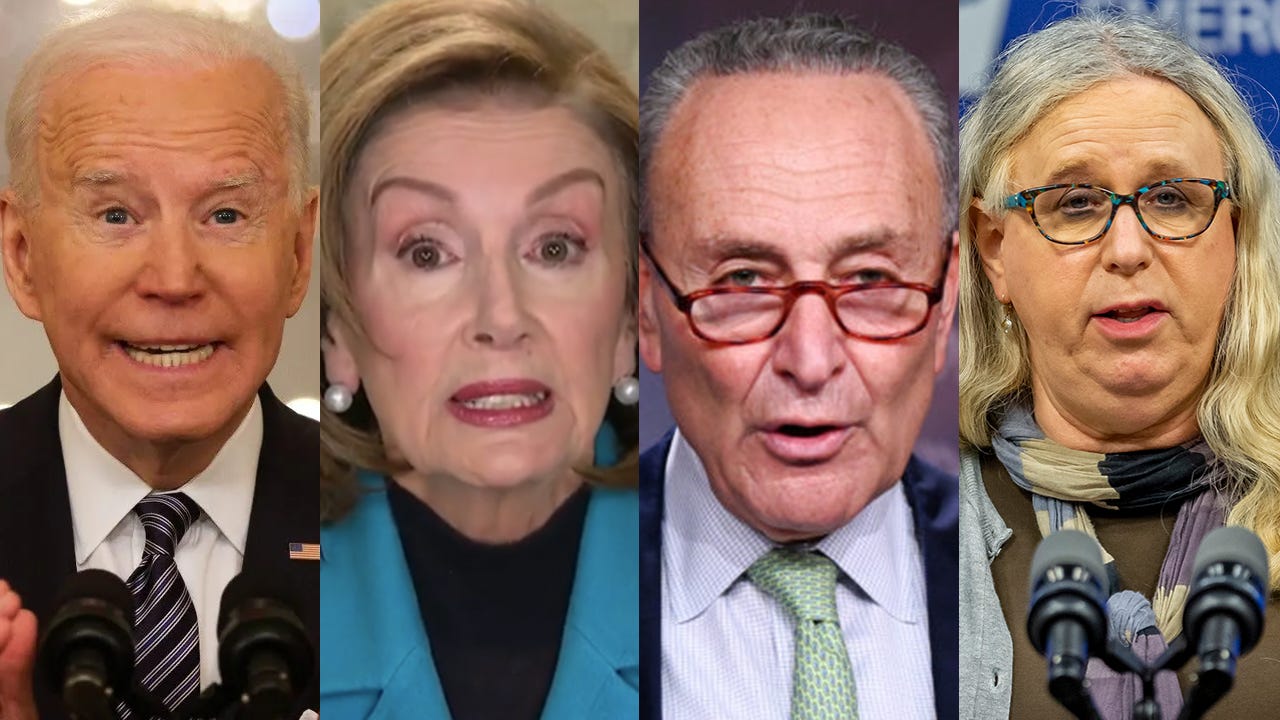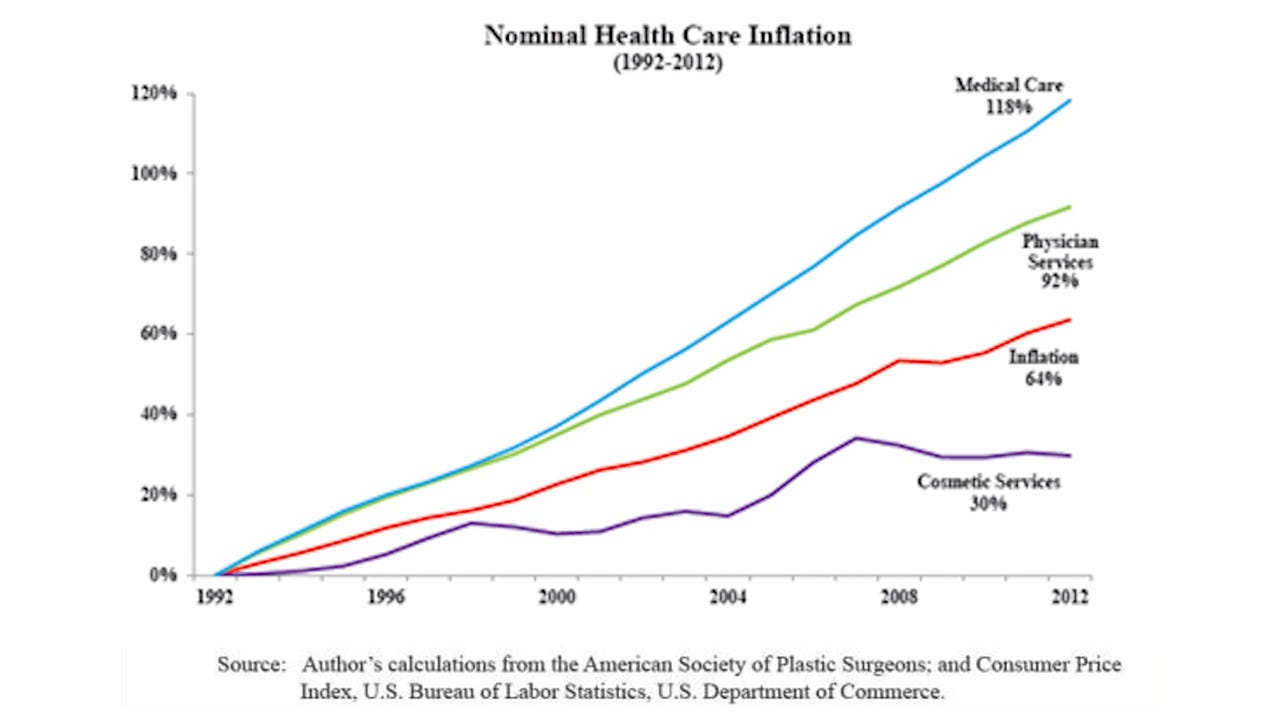The Case for Free-Market Healthcare
The US has a mostly socialist healthcare system.
The government accounts for over 65% of U.S. healthcare spending and the 35% that is “private” is highly distorted by regulations. Here are some of those regulations…
Employer-based health insurance mandate for companies with over 50 full-time workers and tax penalties for individuals who try to self-insure. Your healthcare shouldn’t be dependent upon and decided by your employer.
Medical licenses. I’m a strong supporter of credentialing, but they shouldn’t be required by law to practice medicine. There’s always a chance one gets an incompetent doctor, but consumer empowerment via reviews, reports, ratings, and when appropriate lawsuits is better at mitigating risk than limiting the number of people who can enter the field, ostensibly to protect the consumer, but in reality to protect the seller. America has the highest-paid doctors in the world because the American Medical Association has successfully mandated a doctor shortage.
The average cost of a medical malpractice claim has increased by more than 50% since 2009, but the true cost isn’t so much in the claims themselves, but in what’s called “defensive medicine” whereby doctors will over-test-and-over-treat to avoid any potential lawsuit. We need to reduce malpractice claims, which can be done via tort reform and patients’ compensation (similar to workers’ compensation).
Certificate-of-Need: New hospitals are prohibited from opening without the approval of existing hospitals. This has made the hospital industry into a cartel. Hospital spending is a third of overall healthcare spending.
Customers are prohibited from buying health insurance across state lines.
Customers are prohibited from buying prescription drugs from overseas.
The FDA doesn’t trust individuals to do their own cost-benefit analysis so they prohibit medical products from entering the market until they give their approval. Big Pharma has successfully lobbied to increase the average cost of drug development to over $1 billion and a 10-year wait time. The FDA may sound good in theory, but its politicization of medicine has led to more corruption and its general risk-aversion has cost untold lives (an eight-year delay in the FDA’s approval of Provenge was estimated to have cost 82,000 lost life years) while at the same time the FDA seal of approval gives people a false sense of confidence when its track record hasn’t been great. Between 2004–2014, the FDA recalled more than 4,000 drugs.
With 20-year patents, drug companies are incentivized to spend a lot of money filing and enforcing them. Patents should be abolished or at least cut down to 4 years because ultimately what drives innovation isn’t temporary monopoly control over a product, but by innovating so fast that the competition can’t keep up because they haven’t mastered the fundamentals. In other words, the most successful drug companies shouldn’t be the ones that own the rights to the best drugs (rent-seeking), but that constantly innovate better ones. For example, Elon Musk has gone so far as to open-source Tesla despite their enormous research costs because he knows copycats make for weak tigers.
NIH grants saddle medical researchers in bureaucratic paperwork and pull their focus away from researching treatments that the market actually wants to fund. We should abolish the NIH, or at least reform federal funding where it would only be provided after-the-fact for achieving clearly defined national goals in high need areas like cancer, heart disease, and longevity. It shouldn’t be spent on studying cocaine’s effect on the sexual habits of Quail.
States’ are forced to comply with federal micromanagement of Medicaid in order to receive matching federal funds. These top-down requirements diminish states’ rights and force the poor into an inadequate, insolvent system.
Is the solution to our broken healthcare system therefore to give even more control over our bodies to a corrupt incompetent federal body?
If you think healthcare is expensive now wait till you see how expensive it is when it’s “free.” — John Stossel
Authoritarians think the answer is yes because “healthcare is a human right!” They only differ on whether they want a government option or a government monopoly in health insurance and/or treatment.
They believe our federal government will be able to increase access, affordability, and quality.
They point to international metrics such as infant mortality, which countries calculate differently, lifespans, which Americans choose to drive, eat, drink, and kill more often, and healthcare costs, which can only be so high due to its socialist aspects and where if we compare the true cost of government health insurance (Medicaid/Medicare) to “private” health insurance by factoring in the cost of tax collection, which deceitful studies tend to leave out, then they’re actually about the same, but nonetheless pointing to government-created problems to justify greater government control has always worked on the government “educated.”
Our federal government can’t balance a budget, read the bills it enacts into law, avoid shutdowns, keep the Taliban out of power, define a woman, create an enrollment website, keep millions of people from illegally entering the country, but it can apparently micromanage the healthcare choices of 320 million Americans?
Come on, man! Are these really the people you want controlling your body?
We need to reverse the trend toward centralization.
We need free-market healthcare by repealing all the aforementioned regulations.
Free the patient! Free the doctor! Free the entrepreneur!
With more competition, prices would come down and quality would go up. Economics 101.
The freest part of American healthcare is direct-primary care and it’s also the cheapest.
We charge $75 a month for an adult. After that, we charge nothing more for the services provided in our office… If you can afford a cell phone then you can afford the most basic healthcare aspect in the United States. — Dr. Lee Gross
The freest sector of American healthcare is cosmetic surgery and it’s also one of the cheapest and most innovative.
One of the freest healthcare systems in the developed world is America’s, which as we’ve seen isn’t saying much, but nevertheless with more socialist systems so dependent upon American innovation to keep their people alive — 57% of new medicines come from America with 12 of the top 20 medical device companies headquartered here — imagine how much better the world would be if America was more free again.
But then authoritarians compassionately fall back on… “what about access for the poor?!”
For one, even in our existing system states can implement single-payer, which in terms of population and GDP would be more comparable to existing single-payer countries (i.e. Denmark has a smaller population and GDP than NYC), but of course, when push comes to shove even Democrats in dark blue states vote down single-payer once they learn how much higher taxes would have to be.
With that said, a key problem in healthcare is the free-rider problem. Most Republicans supported Trumpcare, which would’ve kept in place the ban on health insurance companies being able to discriminate based on pre-existing conditions, but the only way to then discourage people from buying health insurance the moment they get sick is to have a health insurance mandate.
I believe in a state-based catastrophic health insurance mandate ($170) and then for primary care let people choose if they want to pay-out-of-pocket or buy additional health insurance ($80).
For those who can’t afford $250 a month then there are three options:
If the U.S. had more of a free-market then I believe unemployment would be virtually eliminated whereby the few who fall through the cracks would be covered by family, charity, and lodges. The word “unemployment” didn’t even exist until the late 19th century.
But unfortunately, the developed world has become so authoritarian in our thinking that faith in the individual is often met by disgust by those who think that without a large public trough people would starve to death in modern America. How dare I wish to unlock the poor’s potential by not enabling failure?! How dare I wish to empower the rich by not punishing success?! One can only be great who has been given the freedom to fail.
But political realities in mind, repealing the aforementioned regulations wouldn’t abolish Medicaid, which already “guarantees” access to the poor (in practice, no such guarantee exists on Earth because even in “universal” systems you can be denied care or die while waiting for your “guaranteed access”), but simply turns it into a block grant (as it already is in U.S. territories) in order to give U.S. states greater flexibility in how they cover their poor.
My preference is to put that money toward a state-based job guarantee to effectively eliminate poverty itself. Anyone who wants a job could get one. By guaranteeing job security it’ll be much easier to win political support for cutting government spending and regulations, which will then free the free-market to such a degree that virtually everyone would choose to work in the better-paid private sector over the low-paid public sector, which as a condition of passing a job guarantee we’d have to abolish public-sector unions, benefits, tenure, and tie the bottom guaranteed rung to 30% below whatever is the state’s average hourly earnings ($7.81 in avg. state). Ultimately, instead of paying people to do nothing (welfare), I’d rather pay people to do workfare. But since this is also unlikely to happen anytime soon then I propose: health vouchers.
A health voucher is similar to a school voucher, which conservatives support, or a food voucher (aka food stamps), which conservatives and liberals support.
The state would give poor residents a Health Savings Account where a few hundred dollars would be added to it every month to spend on primary care and catastrophic health insurance.
In the end, free-market healthcare would increase affordability, quality, and access where instead of having an evermore consolidated system that manages one’s patience we’d have a more competitive ecosystem that empowers the patient. Freedom is only limited by the imagination.





